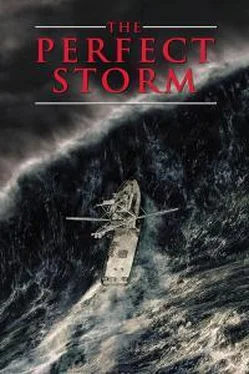Sebastian Junger - The Perfect Storm
Здесь есть возможность читать онлайн «Sebastian Junger - The Perfect Storm» — ознакомительный отрывок электронной книги совершенно бесплатно, а после прочтения отрывка купить полную версию. В некоторых случаях можно слушать аудио, скачать через торрент в формате fb2 и присутствует краткое содержание. Жанр: Триллер, Проза. Описание произведения, (предисловие) а так же отзывы посетителей доступны на портале библиотеки ЛибКат.
- Название:The Perfect Storm
- Автор:
- Жанр:
- Год:неизвестен
- ISBN:нет данных
- Рейтинг книги:3 / 5. Голосов: 1
-
Избранное:Добавить в избранное
- Отзывы:
-
Ваша оценка:
- 60
- 1
- 2
- 3
- 4
- 5
The Perfect Storm: краткое содержание, описание и аннотация
Предлагаем к чтению аннотацию, описание, краткое содержание или предисловие (зависит от того, что написал сам автор книги «The Perfect Storm»). Если вы не нашли необходимую информацию о книге — напишите в комментариях, мы постараемся отыскать её.
The Perfect Storm — читать онлайн ознакомительный отрывок
Ниже представлен текст книги, разбитый по страницам. Система сохранения места последней прочитанной страницы, позволяет с удобством читать онлайн бесплатно книгу «The Perfect Storm», без необходимости каждый раз заново искать на чём Вы остановились. Поставьте закладку, и сможете в любой момент перейти на страницу, на которой закончили чтение.
Интервал:
Закладка:
"After I lost contact with the raft I was by myself and I realized my only chance of survival was to make it until the storm subsided," he says. "There was no way they could pick us up, I'd just ditched a perfectly good helicopter and I knew our guys would be the ones to come out and get us if they could, but they couldn't. They couldn't refuel. So I'm contemplating this and I know I cannot make it through the storm. They might have somebody on-scene when light breaks, but I'm not going to make it that long. I'm dying inside."
For the first time since the ordeal began, Spillane has the time to contemplate his own death. He isn't panicked so much as saddened by the idea. His wife is five months pregnant with their first child, and he's been home very little recently—he was in paramedic school, and in training for the New York City marathon. He wishes that he'd spent more time at home. He wishes—incredibly—that he'd cut the grass one more time before winter. He wishes there was someone who could tell his wife and family what happened in the end. It bothers him that Dave Ruvola probably died taking the helicopter in. It bothers him they're all going to die for lack of five hundred pounds of jet fuel. The shame of it all, he thinks; we have this eight-million-dollar helicopter, nothing's wrong with it, nobody's shooting at us, we're just out of fuel.
Spillane has regained his full senses by this point, and the circumstances he finds himself in are nightmarish beyond words. It is so dark that he can't see his hand in front of his face, the waves just rumble down on him out of nowhere and bury him for a minute at a time. The wind is so strong it doesn't blow the water so much as fling it; there is no way to keep it out of his stomach. Every few minutes he has to retch it back up. Spillane has lost his one-man life raft, his ribs are broken, and every breath feels like he is being run through with a hot fire poker. He is crying out in pain and dawn isn't for another eight hours.
After an hour of making his farewells and trying to keep the water out of his stomach, Spillane spots two strobes in the distance. The Mustang suits all have strobe lights on them, and it is the first real evidence he has that someone else has survived the ditching. Spillane's immediate reaction is to swim toward them, but he stops himself. There is no way he is going to live out the night, he knows, so he might as well just die on his own. That way he won't inflict his suffering on anyone else. "I didn't want them to see me go," he says. "I didn't want them to see me in pain. It's the same with marathons—don't talk to me, let me just suffer through this by myself. What finally drove me to them was survival training. It emphasizes strength in numbers, and I know that if I'm with them, I'll try harder not to die. But I couldn't let them see me in pain, I told myself. I couldn't let them down."
Believing that their chances will be slightly less negligible in a group, Spillane slowly makes his way toward the lights. He is buoyed up by his life vest and wetsuit and swimming with his broken arm stretched out in front of him, gripping the blanket bag. It takes a long time and the effort exhausts him, but he can see the lights slowly getting closer. They disappear in the wave troughs, appear on the crests, and then disappear again. Finally, after a couple of hours of swimming, he gets close enough to shout and then to make out their faces. It is Dave Ruvola and Jim Mioli, roped together with parachute cord. Ruvola seems fine, but Mioli is nearly incoherent with hypothermia. He only has his Nomex flight suit on, and the chances of him lasting until dawn are even lower than Spillane's.
Ruvola had escaped the helicopter unscathed, but barely. He knew that the rotors would tear him and the helicopter apart if they hit the water at full speed, so he moved the aircraft away from his men, waited for the number two engine to flame out, and then performed what is known as a hovering auto-rotation. As the helicopter fell, its dead rotors started to spin, and Ruvola used that energy to slow the aircraft down. Like downshifting a car on a hill, a hovering auto-rotation is a way of dissipating the force of gravity by feeding it back through the engine. By the time the helicopter hit the water it had slowed to a manageable speed, and all the torque had been bled out of the rotors; they just smacked the face of an oncoming wave and stopped.
Ruvola found himself in a classic training situation, only it was real life: He had to escape from a flooded helicopter upside-down in complete darkness. He was a former PJ, though, and a marathon swimmer, so being underwater was something he was used to. The first thing he did was reach for his HEEDS bottle, a three-minute air supply strapped to his left leg, but it had been ripped loose during the ditching; all he had was the air in his lungs. He reached up, pulled the quick-release on his safety belt, and it was then that he realized he'd never kicked the exit door out. He was supposed to do that so it wouldn't get jammed shut on impact, trapping him inside. He found the door handle, turned it, and pushed.
To his amazement, the door fell open; Ruvola kicked his way out from under the fuselage, tripped the CO2 cartridge on his life vest, and shot ten or fifteen feet to the surface. He popped up into a world of shrieking darkness and landsliding seas. At one point the crest of a wave drove him so far under the surface that the pressure change damaged his inner ear. Ruvola started yelling for the other crew members, and a few minutes later flight engineer Mioli—who'd also managed to escape the sinking helicopter—answered him in the darkness. They started swimming toward each other, and after five or ten minutes Ruvola got close enough to grab Mioli by his survival vest. He took the hood off his survival suit, put it on Mioli's head, and then tied their two bodies together with parachute cord.
They've been in the water for a couple of hours when Spillane finally struggles up, face locked up with pain. The first thing Ruvola sees is a glint of light on a face mask, and he thinks that maybe it's a Navy SEAL who has airlocked out of a U.S. submarine and is coming to save them. It isn't. Spillane swims up, grabs a strap on Ruvola's flotation vest, and clamps his other arm around the blanket bag. What's that? Ruvola screams. I don't know, I'll open it tomorrow! Spillane yells back. Open it now! Ruvola answers. Spillane is in too much pain to argue about it, so he opens the bag and watches several dark shapes—the blankets—go snapping off downwind.
He tosses the bag aside and settles down to face the next few hours as best he can.
ONE can tell by the very handwriting in the District One incident log that the dispatcher— in this case a Coast Guardsman named Gill—can't quite believe what he's writing down. The words are large and sloppy and salted with exclamation points. At one point he jots down, a propos of nothing: "They're not alone out there, "as if to reassure himself that things will turn out all right. That entry comes at 9:30, seconds after Buschor calls in the first engine loss. Five minutes later Gill writes down: "39-51 North, 72-00 West, Ditching here, 5 POB [people on board]. " Seven minutes after that the tanker plane—which will circle the area until their fuel runs low—reports hearing an EPIRB signal for fifteen seconds, then nothing. From Gill's notes: 9:30— Tamaroa in area, launched H-65 9:48—Cape Cod 60!
9:53—CAA [Commander of Atlantic Area]/brfd—ANYTHING YOU WANT—NAVY SHIP WOULD BE GREAT—WILL LOOK.
Within minutes of the ditching, rescue assets from Florida to Massachusetts are being readied for deployment. The response is massive and nearly instantaneous. At 9:48, thirteen minutes into it, Air Station Cape Cod launches a Falcon jet and an H-3 helicopter. Half an hour later a Navy P-3 jet at Brunswick Naval Air Station is requested and readied. The P-3 is infrared-equipped to detect heat-emitting objects, like people. The Tamaroa has diverted before the helicopter has even gone down. At 10:23, Boston requests a second Coast Guard cutter, the Spencer. They even consider diverting an aircraft carrier.
Читать дальшеИнтервал:
Закладка:
Похожие книги на «The Perfect Storm»
Представляем Вашему вниманию похожие книги на «The Perfect Storm» списком для выбора. Мы отобрали схожую по названию и смыслу литературу в надежде предоставить читателям больше вариантов отыскать новые, интересные, ещё непрочитанные произведения.
Обсуждение, отзывы о книге «The Perfect Storm» и просто собственные мнения читателей. Оставьте ваши комментарии, напишите, что Вы думаете о произведении, его смысле или главных героях. Укажите что конкретно понравилось, а что нет, и почему Вы так считаете.












